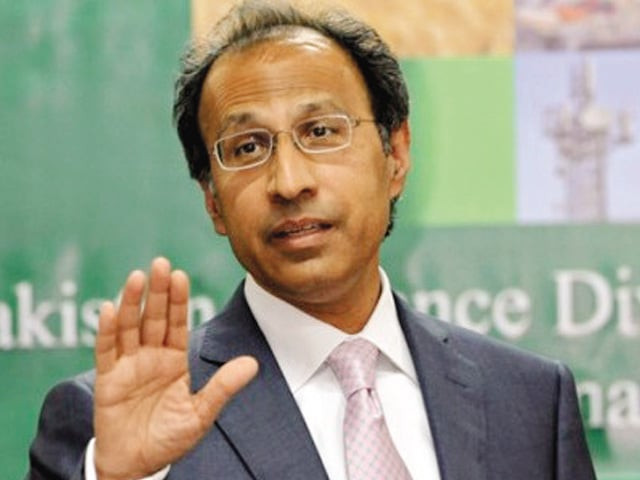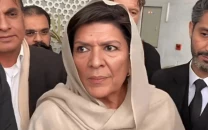Abdul Hafeez Shaikh removed from NFC
Reconstituted commission will comprise nine members

President Dr Arif Alvi has reconstituted the 10th National Finance Commission (NFC) to remove Finance Adviser to the PM Dr Abdul Hafeez Shaikh and amend the terms of reference of the commission aimed at addressing constitutional challenges.
The new notification, issued on Tuesday by the finance ministry, addresses the objections raised by the constitutional experts after President Alvi had constituted the 10th NFC in May this year. Various petitions had been filed at the Islamabad High Court (IHC) and the Sindh High Court (SHC) against the unconstitutional nature of the 10th Commission.
Against the 11-member commission, the reconstituted NFC would comprise nine members after the government removed both the Finance Adviser Shaikh and Finance Secretary Naveed Kamran Baloch from the commission. The Constitution does not allow the adviser and secretary to be part of the commission.
The Balochistan government had also replaced Javed Jabbar with eminent economist Dr Kaiser Bengali. Bengali had also represented Balochistan in the ninth NFC.
In a significant development, the federal government has also modified at least four TORs related to sharing expenditures on Azad Jammu and Kashmir, Gilgit-Baltistan, security, natural disaster, public debt servicing, subsidies and losses of state-owned enterprises. The revised TORs still implicitly provide room for discussion on such issues.
The attorney general for Pakistan on Wednesday submitted the new notification of the 10th NFC in the IHC. Khurram Dastgir Khan, the senior Pakistan Muslim League-Nawaz leader, had challenged the constitution of the 10th NFC and its TORs in the high court.
A similar petition had also been filed in the Sindh High Court by Bengali, challenging both the constitution and TORs of the 10th NFC.
“I had also raised objections over May 2020 notification of the NFC,” AGP Khalid Javed Khan told the court. After the new notification, the IHC disposed of the PML-N’s petition.
The 10-member NFC has been notified under Article 160 (1) of the Constitution. Article 160 (1) says that “the president will constitute an NFC, consisting of the finance minister of the federal government, the ministers of finance of the provincial governments and such other persons as may be appointed By: the president after consultation with the provincial governors.”
In May, the federal government had appointed its three representatives on the commission. After the reconstitution, there will be one representative, the federal finance minister, who happens to be Prime Minister Imran Khan. The finance minister is the NFC chairman.
The NFC decides the division of fiscal resources between the Centre and the provinces and among the provinces for a period of five years. But there is a deadlock between the Centre and the provinces on new award for last five years.
Punjab has nominated Tariq Bajwa, a former governor of the State Bank of Pakistan, as its non-statutory member. Sindh has retained Asad Sayeed, who was also a member of the last NFC that could not decide the award. The Khyber-Pakhtunkhwa government has also retained Musharraf Rasool as its non-statutory member.
Former information minister Jabbar quit the commission after objections that he did not belong to the province. In his place, Dr Bengali has been appointed as non-statutory member from Balochistan. Dr Bengali has represented Sindh in the 8th NFC and Balochistan in the 9th commission.
The 7th NFC Award that had been unanimously agreed in 2010 expired in 2015 is being extended every year by the president due to a lack of consensus on the 8th Award.
There is increasing pressure on the provinces to give up part of their fiscal shares or take additional expenditure responsibilities.
Despite transferring various functions to the provinces, the successive central governments have been financing health and education-related expenditures. The federal government also made parallel setups at the Centre despite such functions rest with the provinces under the Constitution.
Under the 7th NFC Award, the Centre got 42.5 per cent from the divisible pool. The remaining 57.5% share was distributed among the provinces on the basis of multiple formulae. Eighty-two per cent share was determined on the basis of population, 10.3% is based on poverty and backwardness, 5% on revenue collection and 2.7% on inverse population density.
That was the last award agreed unanimously that led to 11% increase in the shares of provinces in federal taxes. To compensate for this 10% loss to the Centre, the federal government at that time had developed a plan to increase the tax-to-GDP ratio by one percentage point every year to 15% by 2015. However, three successive governments failed to enhance the tax collection due to poor performance of the FBR and political compromises struck by every government.



















COMMENTS
Comments are moderated and generally will be posted if they are on-topic and not abusive.
For more information, please see our Comments FAQ